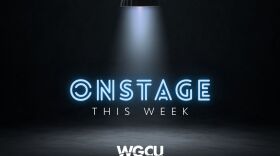Updated August 29, 2022 at 12:38 PM ET
As the week begins, here's a roundup of key developments from the past week and a look ahead.
What to watch this week
Monday: A team from the International Atomic Energy Agency is on its way to visit the Zaporizhzhia nuclear power plant. The IAEA's director, Rafael Mariano Grossi, is leading the mission.
Also Monday, Ukraine said it launched attacks against Russian forces in the south. Battles will be watched for signs of Ukraine's anticipated counteroffenseive to retake areas such as the city of Kherson.
Tuesday: European Union defense ministers and foreign ministers will meet in an informal summit in Prague, to continue through Wednesday. The foreign ministers are expected to decide on a proposed ban on Russian tourists.
Wednesday: Russia's Vostok-2022 military exercises will begin in the country's east, to continue through the week. China and India are among the countries expected to take part in the drills.
Thursday: The Venice Film Festival will host "Ukrainian Day," with a series of initiatives in support of Ukraine and its artists.
Friday: Russian journalist Dmitiri Muratov will join fellow Nobel laureates at a conference on freedom of expression in Oslo.
Sunday: German Chancellor Olaf Scholz will host Ukraine's Prime Minister Denys Shmyhal for talks in Berlin.
What happened last week
Aug. 22: The war in Ukraine has caused damage and destruction worth a total $113.5 billion, according to an assessment by the Kyiv School of Economics along with Ukrainian government agencies and a number of other partners. Housing and transportation infrastructure made up the heaviest losses.
Aug. 23: The German Interior Ministry reported that almost 1 million Ukrainian refugees have arrived in Germany since Russia's invasion began in February. More than one-third are children and young people. There are some 6.6 million Ukrainians registered as refugees across Europe.
Aug. 24: Ukraine marked Independence Day, which coincided with the six-month anniversary of Russia's invasion. On the same day, a Russian rocket attack killed 22 people at a train station in the town of Chaplyne. And President Biden announced nearly $3 billion in U.S. military aid.
Aug. 25: The Zaporizhzhia nuclear power plant was temporarily cut off from Ukraine's electrical grid -- the latest point of concern around Europe's largest nuclear plant, which is under Russian occupation in southern Ukraine.
Russian President Vladimir Putin signed a decree to increase the size of Russian armed forces.
Aug. 26: Officials handed out iodine tablets to residents near the Zaporizhzhia nuclear plant in case of a radiation leak.
Aug. 27: Putin issued further decrees giving people from eastern Ukraine's Donbas region access to work and benefits in Russia.
Aug. 28: The United States slammed Russia for blocking consensus on a final document reviewing the Nuclear Non-Proliferation Treaty. In a statement, a State Department spokesman said Russia refused to acknowledge language about "the grave radiological risk at the Zaporizhzhia Nuclear Power Plant in Ukraine."
In-depth
Six key numbers that reveal the staggering impact of Russia's war in Ukraine.
Kyiv hosts a different kind of parade to celebrate Ukraine's independence day.
Once a heavyweight champion, Kyiv's mayor now fights the Russians.
Home is never far for the Ukrainian Freedom Orchestra, even when touring in the U.S.
After a deadly jail blast, Ukrainians want answers about war prisoners held by Russia.
Special report
Russia's war in Ukraine is changing the world: See its ripple effects in all corners of the globe.
Earlier developments
You can read past recaps here. For context and more in-depth stories, you can find more of NPR's coverage here. Also, listen and subscribe to NPR's State of Ukraine podcast for updates throughout the day.
Copyright 2022 NPR. To see more, visit https://www.npr.org.
Loading...




